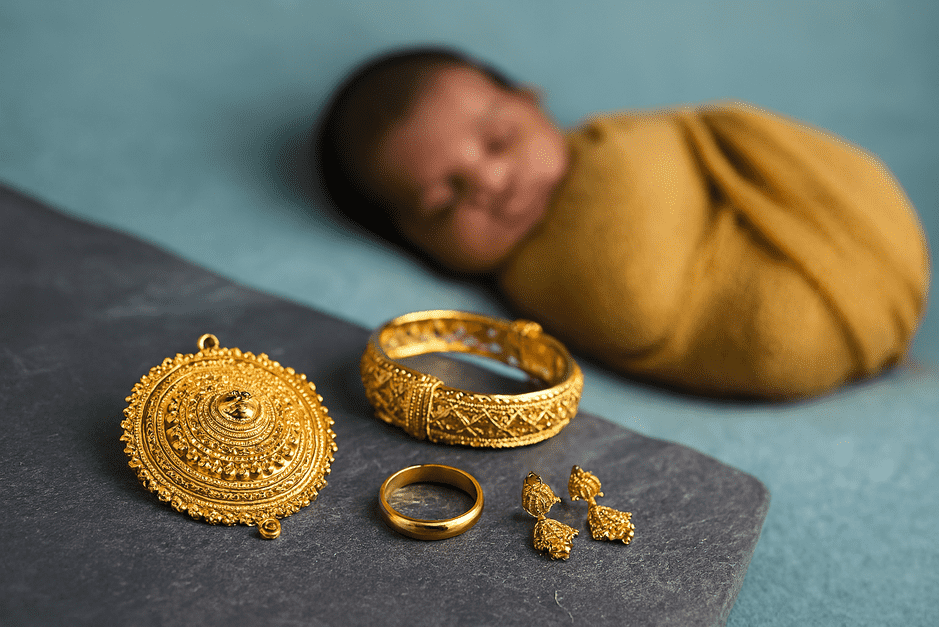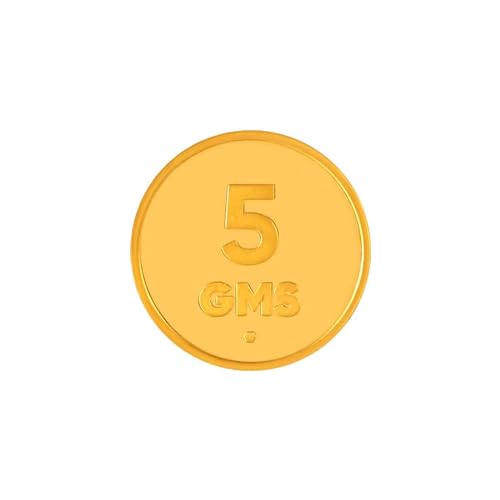Why Buying Gold for a Newborn in Kerala Matters
Buying gold for a newborn in Kerala is more than a gift. It is a tradition deeply tied to family, culture, and blessings. Parents usually choose bangles, chains, or an Aranjanam. But not every design is safe. Many families unknowingly make choices that can harm the baby. In this guide, I’ll explain the three biggest mistakes and show you how to choose jewellery that is safe, practical, and meaningful.
Mistake 1: Choosing Jewellery with Sharp Edges When Buying Gold for a Newborn in Kerala
A newborn’s skin is soft and sensitive. Even a small edge on a bangle can cause scratches or bleeding. In my 40+ years of experience, I’ve seen families return distressed because a “beautiful” design hurt their baby. The key is simple: always check ornaments for smooth finishes. If it scratches your finger, it is not safe for a newborn.
For more guidance, read my Gold Buying Checklist for Malayalis.
Mistake 2: Buying Tight Ornaments for Newborns in Kerala
An Aranjanam that fits snugly may look elegant, but it can reduce blood flow. Medical studies show that 20% of jewellery-related infant emergencies involve circulation issues (NCBI). Always choose adjustable designs and leave room for growth.
To understand why Aranjanam carries cultural importance, explore the post on the Cultural Meaning of Aranjanam in Kerala.
Mistake 3: Choking Hazards in Baby Jewellery in Kerala
Charms, beads, and dangling parts may seem attractive, but they can be deadly. Research shows 14% of choking incidents in infants under one year are linked to small accessories (World Gold Council). Always pick plain, sturdy ornaments.
For assurance about purity and safety, see Understanding BIS Hallmark in Jewellery.
Safe and Practical Gold Jewellery Options for Newborns in Kerala
- Rounded bangles with smooth edges
- Adjustable waist chains (safe Aranjanam)
- Lightweight, plain pendants
Not sure which gold type is best? The guide on 24K vs 22K vs 18K Gold Explained covers everything you need to know.
Expert Advice for Buying Gold for a Newborn in Kerala
In my decades of work in gems and jewellery, I’ve advised many families. The key is this: safety comes before weight or style when buying gold for a newborn in Kerala.
For more design inspiration, see Safe Jewellery Designs for Children.
FAQ
Q1: Can newborns wear earrings immediately?
No. Wait at least six months and consult a doctor.
Q2: How much gold should I buy for a newborn in Kerala?
Traditionally, families buy 2–4 grams. Focus on safe design over weight.
Q3: Which designs are best for daily wear?
Smooth bangles, adjustable waist chains, and plain pendants.
Q4: Should I choose 22K or 24K gold for newborn jewellery?
22K gold is the best balance between purity and durability.
Introduction
This Responsible Travel FAQ provides comprehensive answers to help you make ethical tourism choices.
Our guide covers eco-friendly accommodations, local community support, sustainable transportation, cultural respect, wildlife ethics, and ways to reduce waste.
Following these practices ensures your adventures benefit both destinations and travelers.
What is Responsible Travel and Why Does It Matter?
Responsible travel means making conscious choices that minimize negative impact while maximizing benefits for local communities and the environment.
Tourism generates $1.4 trillion annually but produces 8% of global carbon emissions.
Your travel decisions affect local economies, cultural preservation, and environmental conservation.
How Do I Choose Sustainable Accommodations?
Look for eco-certifications such as:
- Green Key
- LEED building standards
- EarthCheck approval
- Rainforest Alliance verification
Check if hotels use renewable energy, water-saving systems, and source food locally.
Ask about waste reduction programs and community involvement. Calling properties directly helps verify claims.
Transportation Options for Responsible Travel
- Train travel emits 80% less carbon than flying for similar distances.
- Choose direct flights when necessary and book economy class.
- Use public transport, bicycles, or walk instead of renting cars.
- Consider verified carbon offsets for unavoidable flights.
Supporting Local Economies
- Buy from locally-owned businesses instead of chains.
- Book community-based tours with local guides.
- Eat at family-owned restaurants with local ingredients.
- Stay in homestays or boutique hotels rather than international chains.
- Purchase authentic handicrafts fairly from artisans.
Packing Tips for Responsible Travel
- Reusable water bottle with filtration
- Solid toiletries to reduce plastic
- Reef-safe mineral sunscreen
- Reusable shopping bags
- Bamboo or metal utensils
- Portable laundry soap
Pack light and choose durable, multipurpose items.
Respecting Local Cultures
- Learn cultural customs, dress codes, and etiquette.
- Learn basic local phrases.
- Dress appropriately for religious and conservative areas.
- Ask permission before photographing people.
- Participate respectfully in cultural activities.
Ethical Wildlife Encounters
- Maintain safe distances and avoid feeding animals.
- Choose conservation-focused sanctuaries, not entertainment attractions.
- Avoid elephant rides, direct contact, or photo opportunities with captive animals.
- Use certified naturalist guides who prioritize welfare and habitat protection.
Reducing Waste During Travel
- Use reusable containers, bags, and utensils.
- Refuse single-use plastics.
- Choose digital tickets and receipts.
- Carry a small trash bag where disposal is limited.
Questions to Ask Tour Operators
- Are staff local and fairly paid?
- How does your business give back to communities?
- What environmental practices are in place?
- Are group sizes limited to reduce pressure on sensitive areas?
- Are wildlife experiences ethical and conservation-focused?
Money and Overtourism Practices
- Use local ATMs and tip according to local customs.
- Support social enterprises and cooperatives.
- Visit during shoulder seasons, off-peak hours, or lesser-known areas.
- Stay longer in fewer destinations.
Responsible Travel on a Budget
- Cook using local market ingredients.
- Use public transportation.
- Stay in local hostels, guesthouses, or homestays.
- Explore free cultural events or walking tours.
- Exchange skills or volunteer for free accommodation.
Pre-Travel Research
- Learn about environmental challenges and cultural sensitivities.
- Check seasonal weather and political situations.
- Identify local organizations to support.
- Read destination-specific responsible travel guides.
Creating a Positive Impact Post-Travel
- Share authentic stories on social media.
- Write detailed reviews for responsible businesses.
- Continue supporting local organizations.
- Apply sustainable practices in daily life.
- Recommend responsible travel to others.
Learn more:




